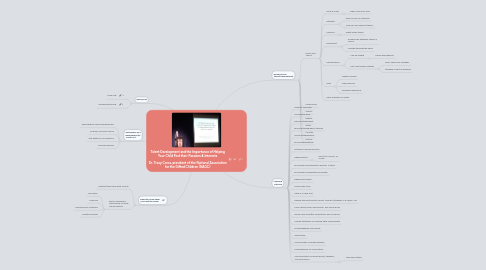Talent Development and the Importance of Helping Your Child Find their Passions & Interests Dr. Tracy Cross, president of the National Association for the Gifted Children (NAGC)
af Toni Krasnic


1. Influences on talent development
1.1. Home and family
1.1.1. Hints & clues
1.1.1.1. Signs from your kids
1.1.2. Interests
1.1.2.1. Keep an eye on interests
1.1.2.2. How can you support them?
1.1.3. Passions
1.1.3.1. What drives them?
1.1.4. Enjoyment
1.1.4.1. Differences between school & home
1.1.4.2. Change through the years
1.1.5. Perseverance
1.1.5.1. Can be taught
1.1.5.1.1. Model the behavior
1.1.5.2. Ok to fail/make mistakes
1.1.5.2.1. Learn flow from mistakes
1.1.5.2.2. Struggle is part of growing
1.1.6. Flow
1.1.6.1. Highly focused
1.1.6.2. High learning
1.1.6.3. Pleasant experience
1.1.7. Early evidence of ability
1.2. Community
1.3. School
1.4. Region
1.5. State
1.6. Country
1.7. History
2. Learning Literacy
2.1. Support your kids!
2.2. Model hard work
2.3. Express enjoyment
2.4. Be forthcoming about failures
2.5. Model perseverance
2.6. Encourage practice
2.7. Introduce myriad domains
2.8. Reward effort
2.8.1. Don't say "you're so smart"
2.9. Encourage involvement in domain culture
2.10. Encourage collaboration in domain
2.11. Reward hard work
2.12. Allow down time
2.13. Child is a child first
2.14. Realize the best efforts cannot prevent struggles in a child's life
2.15. Learn about child's personality and social goals
2.16. Teach child to better understand him or herself
2.17. Coping strategies for dealing with being gifted
2.18. Knowledgeable counseling
2.19. Mentorship
2.20. Communities of gifted children
2.21. Clearinghouse for information
2.22. Communication among parents, teachers, and counselors
2.22.1. Help each other!
3. Need to move away from entity model
3.1. Abilities/talent are what counts
3.2. Fails to recognize importance of other critical factors
3.2.1. Hard work
3.2.2. Learning
3.2.3. Learning from mistakes
3.2.4. Growth mindset
